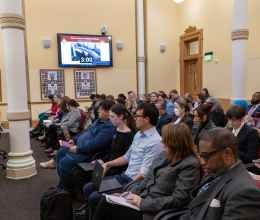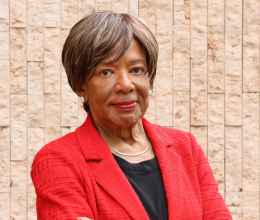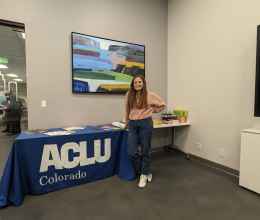
The bill implements various changes to the "Uniform Election Code of 1992" (code).
Residency. Currently, to be eligible to register to vote, a person must have resided both in the state and in the precinct in which he or she intends to register for at least 30 days prior to an election. The bill shortens the time required for state residency to 22 days and eliminates the minimum time that an elector must have resided within a Colorado precinct.
Registration. Under current law, voter registration must be effected no later than 29 days before an election for a person to cast a ballot in that election. The bill expands the time during which a person may register to vote in an election, and describes the deadlines associated with the various methods of voter registration. Specifically, a person may register by:
- Submitting a voter registration application through the mail, a voter registration agency, or a voter registration drive no later than 22 days prior to an election;
- Appearing in person at his or her county clerk and recorder's office when registration is permitted at the office or submitting an application at a high school in accordance with high school registration procedures;
- Applying via a local driver's license examination facility or through the on-line voter registration system maintained by the secretary of state through 8 days prior to an election;
- Visiting a voter service and polling center during the time that such location is open, including on or prior to the date of the election.
The bill harmonizes the content of self-affirmations made in connection with registering to vote.
Mail ballot elections. Under the bill, a mail ballot election is an election for which active registered electors receive a ballot by mail and may then cast the ballot by mail, deposit it at a drop-off location, or go to a voter service and polling center to cast a ballot in person. The bill requires all general, primary, odd-year, coordinated, presidential, special legislative, recall, and congressional vacancy elections to be conducted as mail ballot elections. Consequently, the ability of an elector to apply for permanent mail-in status is removed from the code.
The bill limits current code provisions relating to early and mail-in voting to municipality and special district elections conducted under state law.
Voter service and polling centers and ballot drop-off locations. To complement the implementation of mail ballot elections, the bill requires county clerk and recorders to establish a minimum number of voter service and polling centers, depending on the number of active registered voters in the county. Factors that county clerk and recorders must consider in designating voter service and polling centers are enumerated.
Each voter service and polling center must provide the following:
- The ability for an eligible elector to register to vote;
- The ability for an eligible elector to cast a ballot;
- The ability for an eligible elector to update his or her address;
- The ability for an eligible elector who has legally changed his or her name to have his or her name changed in the registration records;
- The ability for an unaffiliated registered elector to affiliate with a political party and cast a ballot in a primary election;
- Secure computer access; except that smaller counties may seek a waiver of this requirement upon demonstrating hardship and securing approval of a plan to access the statewide voter database and conduct real-time verification of voter eligibility via telephone or other means;
- Facilities and equipment for persons with disabilities, including direct record electronic voting machines or other voting systems accessible to electors with disabilities;
- Voting booths;
- Original and replacement ballots for distribution;
- Mail ballots to requesting electors;
- The ability to accept mail ballots that are deposited by electors; and
- The ability of a person to cast a provisional ballot.
In addition to voter service and polling centers, certain counties must also establish stand-alone drop-off locations.
Inactivity by reason of failure to vote. The bill repeals the category of voter inactivity that is triggered by an elector's failure to vote and makes all such voters active. As a result, such voters will receive mail ballots in future elections.
Electronic communications transmission. Except for ballots and voter information cards, upon request, county clerks and recorders are authorized to transmit electronically elections-related communications to voters. Colorado voter access and modernized elections commission.
The Colorado voter access and modernized elections commission (commission) is created for the purpose of evaluating implementation of the bill and assessing systems used in the state for voting and registration. The composition, terms, and duties of the commission are specified, and the commission is directed to prepare and present 4 separate reports to the state, veterans, and military affairs committees of the house of representatives and the senate. The commission is subject to the sunset review process for newly created advisory committees.
Accuracy of voter information. Beginning July 1, 2013, the secretary of state must conduct a monthly national change of address search on all electors whose names appear in the statewide voter registration list. The secretary of state must transmit data gathered in such searches to county clerk and recorders, who are required to update electors' records pursuant to statutorily prescribed procedures.
Currently, the secretary of state and the department of revenue maintain a reciprocal information-sharing agreement that allows each entity to verify information provided in connection with applications for voter registration. The bill directs the secretary of state to enter into similar information accessibility agreements with the department of public health and environment and the department of corrections.
Terminology. The bill alters various terms used in the code, including:
- Replaces "voter information card" with "confirmation card";
- Except in the case of municipal and special district elections, replaces "polling place" with "voter service and polling center", and creates the term "polling location" to refer to voter service and polling centers or polling places, as applicable;
- Changes the term used to describe overseeing election judges from "supply judge" to "supervisor judge"; and
- Implements "people first" drafting where applicable.
Conforming amendments. The bill makes myriad conforming amendments.
Year
2013
Current status
- 05/10/2013 - Governor Action - Signed

